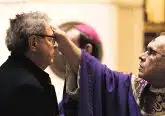A Closer Look: FRATELLI TUTTI, SOLIDARITY AND INCARNATIONAL EMPATHY
On Oct. 3, Pope Francis promulgated the third encyclical of his pontificate, Fratelli Tutti, signed at the tomb of St. Francis on the vigil of the saint’s feast day. The Holy Father takes his title – “All Brothers” – from St. Francis’ Admonitions, a short series of spiritual exhortations to enter more deeply into discipleship and obedience to the Lord. In doing so, Pope Francis continues his program of emphasizing the Church’s social doctrine as an indispensable aspect of Catholic moral theology and solidarity as the specific social doctrine that commands our deeper obedience to the entirety of the Gospel.
SOLIDARITY
While dignity is usually (and properly) considered the first and foundational of the four principles of Catholic social thought, solidarity is the most concrete. It is the principle that most often arises in consideration of our public moral choices. Solidarity is the most cohesive of the doctrines, consolidating dignity, subsidiarity, and common good in moral decision-making. Solidarity is the form of human community, the basis of civic life, and the foundation of authentic friendship – and it is the overarching theme of Fratelli Tutti.
Solidarity, explains Pope Francis, “finds concrete expression in service, which can take a variety of forms in an effort to care for others,” especially in care “for the vulnerable members of our families [and] society.” People practice solidarity when they “set aside their own wishes and desires, their pursuit of power, before the concrete gaze of those who are most vulnerable.” This is a call for us to move beyond superficial expressions of sympathy with the most vulnerable, and to learn to practice the virtue of empathy.
Sympathy is the distant, even indifferent, expression of sorrow or regret for the misfortune of another. It does not require moral investment from the one who expresses it. Empathy, on the other hand, is to enter into and share the suffering of the other. We express empathy when we allow ourselves to be vulnerable to suffering with the sufferer, not merely expressing our distress at her suffering, but participating in it.
Solidarity is the doctrine that accounts for the one image of God in which we all participate. It tells us that we belong to one another. As such, solidarity is the virtue by which we learn and practice empathy.
THE GOOD SAMARITAN
Pope Francis illustrates these points by a lengthy consideration of the parable of the Good Samaritan, introduced by Cain’s defiant assertion that he is not his brother’s keeper. As the Pope explains the story, the Samaritan, who did not know the injured man, “saw him deserving of his time and attention.” As such, the Samaritan teaches us that “the existence of each and every individual is deeply tied to that of others.” And the Holy Father reminds us that Jesus told the parable in response to two inseparable questions: “What must I do to inherit eternal life?” and “Who is my neighbor?”
The answer to the second question is not the person with whom you are already acquainted, or the one who can reciprocate your generosity. Rather, the neighbor is the stranger in the ditch, wounded, vulnerable, helpless and unable to give anything in return for the charity he needs. And we cannot separate eternal life from joining in the suffering of that person – practicing the virtue of empathy as an expression of solidarity.
Applied to our moral lives, solidarity with the wounded man may take many forms. He might be an unborn child, unwanted by his mother, but no less participating in the image of God, and thus as worthy of life and love as we are. Or she might be that child’s mother, poor, scared, desperate and confused, and, thus, in need of comfort and care rather than judgment and condemnation. Solidarity calls us to empathize with both, unequivocally identifying with the unborn child and joining the psychological and spiritual struggle of the mother.
Or the stranger in the ditch might be the immigrant or refugee, having fled persecution, poverty or oppression, but vulnerable, frightened, and overwhelmed by a country that is new and a language she does not understand. Or perhaps the stranger is the prisoner on death row, living each day with the fear of his imminent death at the hands of an uncaring government.
In each of these cases, Fratelli Tutti challenges us to overcome the walls that divide us, whether literal or metaphorical, to obey the call of solidarity, and to participate in the suffering of the preborn child, the mother, the immigrant, and the prisoner. It is the call to make a radical declaration that, yes, contra Cain, we are our brothers’ keepers, and to order our moral, civic, and political lives accordingly.
 Ken Craycraft is an attorney and the James J. Gardner Family Chair of Moral Theology at Mount St. Mary’s Seminary & School of Theology. He holds a Ph.D. in moral theology from Boston College, and a J.D. from Duke University School of Law.
Ken Craycraft is an attorney and the James J. Gardner Family Chair of Moral Theology at Mount St. Mary’s Seminary & School of Theology. He holds a Ph.D. in moral theology from Boston College, and a J.D. from Duke University School of Law.
This article appeared in the December 2020 edition of The Catholic Telegraph Magazine. For your complimentary subscription, click here.













